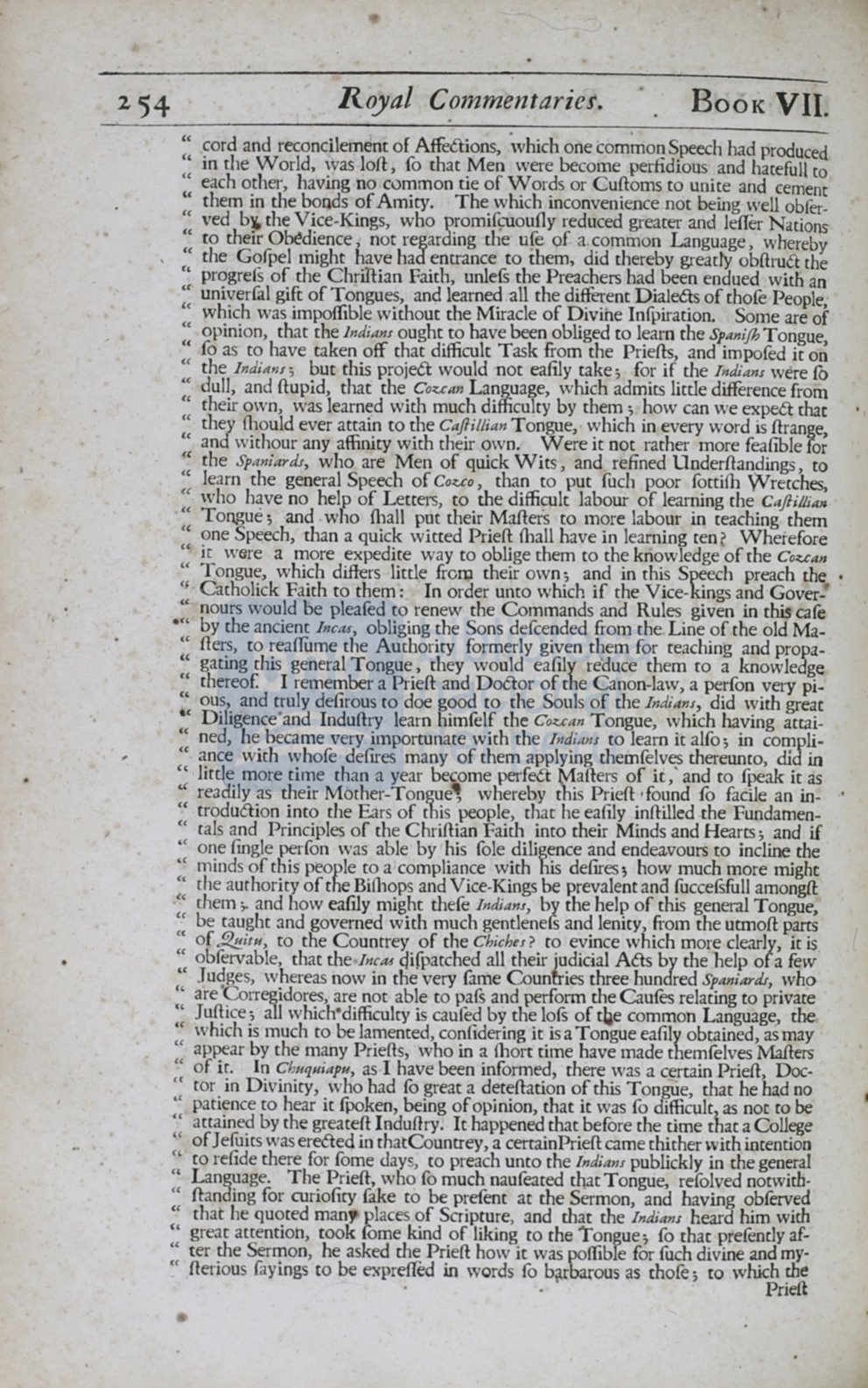

;
I
•
Royal
Co1nmentaries.
BooK
VII.
" cord and reconcilement of Affections, which one common peech had produced
'' in
the
World, was loft, fo that Men were become perfidious and hateful! to
" each other, having no common tie of Words or Cufioms to unite and cement
" them
in
the bonds
ofAmity.
The which inconvenience not being "ell obfer–
" ved b
the Vice-Kings, who prorni[cuoufly reduced greater and leifer Nations
" to their
Ob~dience
, not regarding the ufe
o£
a
common Language, whereby
" the Gofpel might have had entrance to them, did thereby greatly obfirutt
the
'' progrers
of
the Chrill:ian Faith, unlefS the Preachers had been endued with
an
" uni
verfal
gift
of Tongues, and learned all the different Dialects of chafe People
'' which was impoffible without the Miracle of Divine Infpiration.
Some are of
" opinion, that the
Jndians
ought to have been obliged to learn the
Spanijh
Tongue,
" fo
as
to
have taken off that diffirult Task from the Priefts, and impofed it on
'' the
Indiam
5
but chis projelt would not eaftly take; for
if
the
Indians
were fo
'' dull, and fiupid, that the
Couan
Lang_uage, which admits little difference from
" their own, was learned with much difficulty by them ; how can we expelt that
cc
they fhould ever attain to the
Caftillian
Tongue., which
in
every word
is
firange,
" and
\:
ithour any affinity with their own. Were it not rather more feafibie
for
"' the
Spaniard.1,
who are Men of quick Wits, and refined Underfiandings, to
" learn the general Speech of
Couo
,
than to put fuch poor
fotti!h
Wretches,
cc
who have no help of Letters, to the difficult labour of learning the
Caftillian
cc
Tongue ; and who (hall put their Mafiers
to
more labour
in
teaching
chem
'' one Speech,
than
a quick witted Priell: !hall have in learning ren? Wherefore
" it
ere a more expedite way to oblige chem
to
the knowledge of the
Couan
" Tongue, which differs little
from
their own; and
in
this Speech preach the
'~
Catholick Faith to them:
In
order unto which if the Vice-kings and Gover–
" nours would be pleafed to renew the Commands and Rules given
in
this
cafe
•'' by the ancient
IncM,
obliging the ons defcended from che Line of the old
Ma–
ce
fiers,
to
reaffume the Aucboricy formerly given them for teaching and propa–
" gating this general Tongue, they would eaftly reduce them to
a
knowledge
' chereo£
I
remember
a
Priefi and Doetor of the Canon-law, a perfon very pi–
«
ous, and truly defirous to doe good to the ouls of the
Indiani,
did with great
&c
Diligence·and Indufi:ry learn himfelf the
Co:uan
Tongue, which having
attai–
" ned, he became very importunate with the
Indian1
to learn it alfo;
in
compli–
cc
ance with whofe defires many of them applying themfelves thereunto,
did
in
" little more time than a year become erfeet Mafiers of it, and to fpeak
it
as
" readily
as
their Mocher-Tongue, wliereby
rhi
Priefi
1
found
fo
facile an
in-
..
" troduetion into the Ears of chi people, that he eafily in!Hlled -the Fundamen-
cc
rals and Principles of the Chriftian Faith into their Minds and
Hearts; and
if
' one fingle perfon was able by his fole diligence and endeavours to incline the
' mind
f this people to
a
compliance with his defues; how much more might
' ' the authority of the BHhops and Vice-Kings
be
prevalent and fuccefsfull amongll:
" them;. and how eaftly might
thefe
Indiam,
by the help of this general Tongue,
'' be taught and governed with much gentlene!S and lenity, from the utmofi
parts
cc
of
~itu,
to die Counrrey of the
Chiches?
co evince which more clearly, it
is
" obfervable, that the
IncM
qifpatched
all
their judicial A& by the help ofa
few
" Judges, whereas now
in
the very fame Coun ies three hundred
Spaniard.!,
who
' are
orregidores, are not able to pafs and perform the Caufes relating to private
~'
Jufiice;
all
hich difficulty
is
caufed by the lofs oft e common Language,
the
" \ hich
is
much to
be
lamented, confidering it
is
a Tongue eafily obtained,
as may
" appear
by the many Priells, who
in
a
fhort time have made themfelves
Mafters
" of ir.
In
Chl'quiapu,
as I have been informed, there was a certain Priefi,
Doc–
" tor
in
Divinity,
ho had
fo
great a deteftation of
this
Tonglie, that he
had
no
' ' patience
to
hear it fpoken, being ofopinion, that
it
was fo difficult,
as
not robe
"
ttained by the greatell: lndu!lry.
It
happened
that
before the time that a
College
' of
J
efuits
was
erected
in
thatCountrey,
a
certainPriefi came thither with intention
c,
to reGde there for fome days, to preach unto the
Indian.r
publickly
in
the general
' Language. The Prieft, who
fo
much naufeated that Tongue, refolved nocwitb–
cc
fl:
nding for curioficy fake
to
be
prefent at the Sermon, and having obferved
cc
that
he quoted
man
places of Scripture, and
that
the
Indjan1
heard him
wich
'' gr at
attention, took fume
kind
of lilting co the Tongue; fo
that
prefently
af
...
cc
ter
the
rmon, he asked the Prieft how
it
was poffible
for
fuch divine
and
my–
cc
fieriou
fayiogs
to be
expreffed
in \
ords
fo
b~barous
as
thofe; to which the
Prieft














